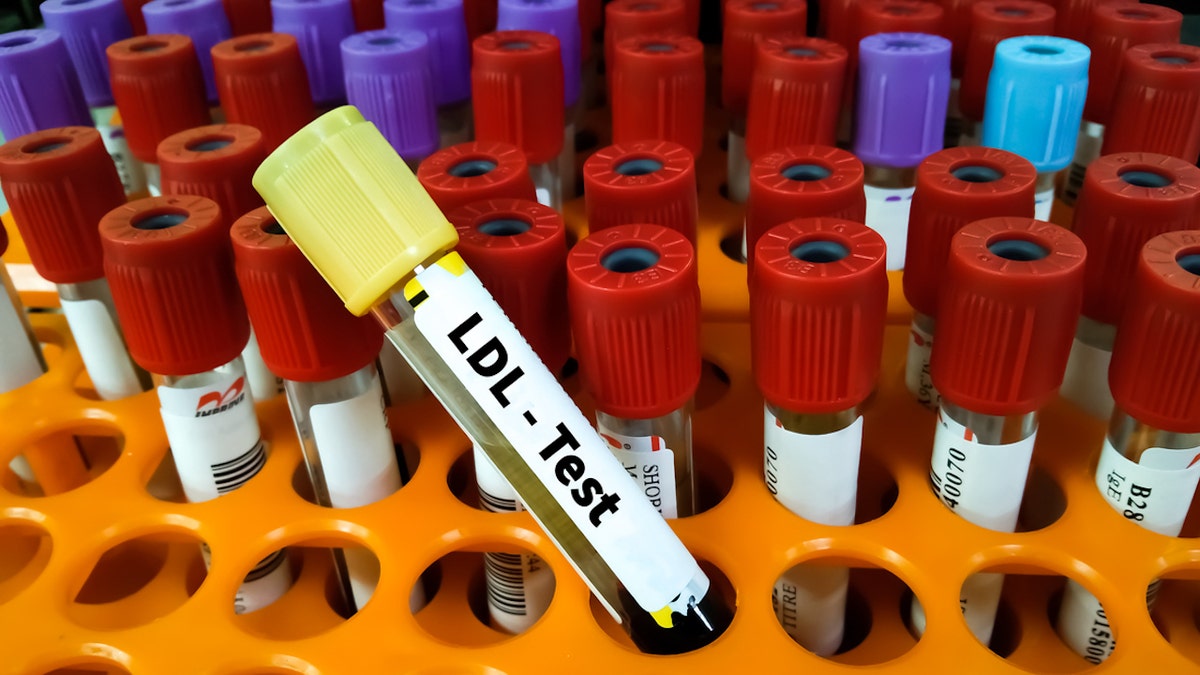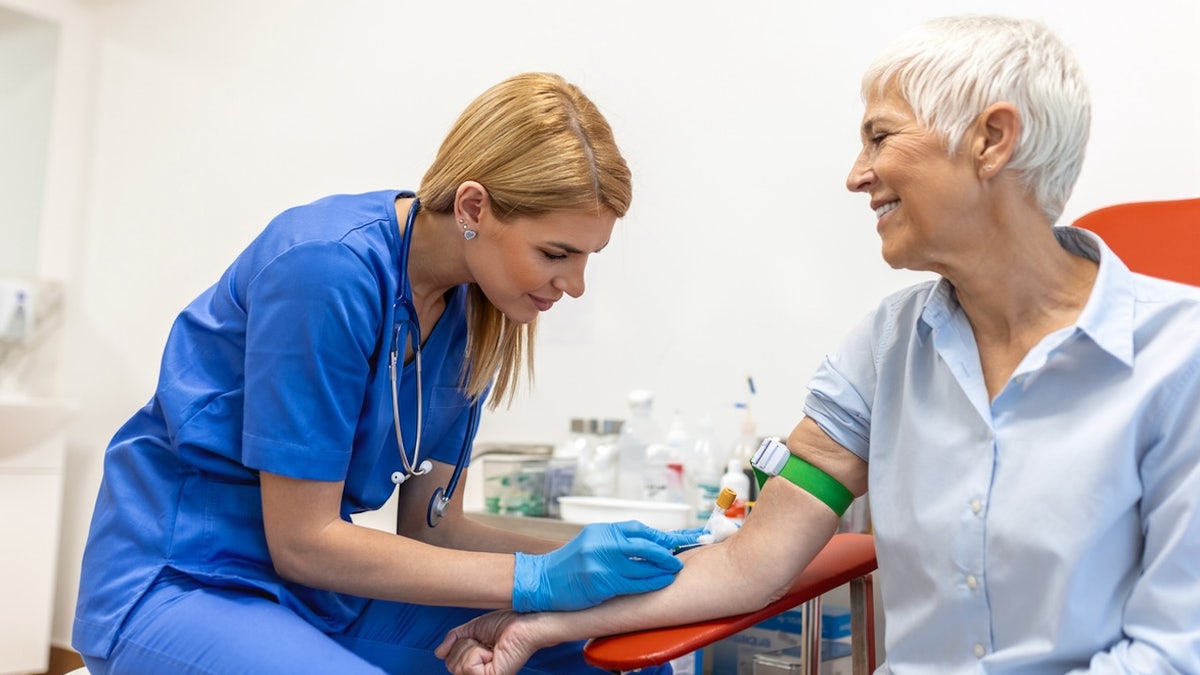Predicting a woman’s future heart disease risk could be as simple as administering a single blood test to screen for three risk factors.
That’s according to research published in The New England Journal of Medicine on Saturday — research that was also presented at the European Society of Cardiology (ESC) Congress this weekend.
The study, which included nearly 30,000 women averaging 55 years of age, measured two types of fat in the bloodstream along with a certain type of protein with a blood test in 1993, then monitored the participants’ health for a 30-year period, the researchers said.
WHEN MEASURING HEART ATTACK RISK, ONE IMPORTANT RED FLAG IS OFTEN OVERLOOKED, DOCTORS SAY
"The strongest predictor of risk was a simple blood measure of inflammation known as high sensitivity C-reactive protein, or hsCRP, followed by cholesterol and lipoprotein(a)," lead study author Dr. Paul Ridker, director of the Center for Cardiovascular Disease Prevention at Brigham and Women's Hospital in Boston, told Fox News Digital.

The study, which included nearly 30,000 women averaging 55 years of age, measured two types of fat in the bloodstream along with a certain type of protein. (iStock)
"Knowing all three predicted risks not just at five or 10 years, but at 20 and 30 years, gives us a road map for how to target specific therapies for the individual patient, rather than an overly simple ‘one-size-fits-all’ approach," he said.
C-reactive protein (CRP) is a protein made by the liver that rises when inflammation occurs in the body, according to Mayo Clinic.
High levels of the protein indicate an elevated risk of heart disease.
COLORADO CARDIAC NURSE, AFTER THREE HEART ATTACKS, OFFERS SURVIVAL TIPS: ‘LISTEN TO YOUR GUT’
LDL cholesterol — also known as the "bad" cholesterol — can build up in the arteries and raise the chances of heart attack or stroke, Mayo Clinic noted.
Lipoprotein(a), or Lp(a), is a type of LDL cholesterol that can also cause plaque buildup in the arteries.
"This is a large, convincing study that puts together three predictive blood tests that haven't been looked at in this way before."
Women with the highest levels of LDL cholesterol were found to have a 36% increased associated risk for heart disease compared to those with the lowest levels, the researchers found.
Those with the highest levels of Lp(a) had a 33% greater risk.
The highest levels of CRP put women at a 70% increased associated risk.

LDL cholesterol, also known as the "bad" cholesterol, can build up in the arteries and raise the chances of heart attack or stroke. (iStock)
Women who had high levels of all three measures were 1½ times more likely to experience a stroke and more than three times as likely to have coronary heart disease, the researchers found.
While most doctors measure cholesterol, very few measure hsCRP and Lp(a), Ridker noted.
THE 9 MOST COMMON QUESTIONS WOMEN OVER 40 ASK THEIR DOCTORS, ACCORDING TO A MENOPAUSE EXPERT
"It is a truism of medicine that doctors will not treat what they do not measure."
The fact that a single combination blood test predicted risk 30 years later is "astonishing," the researcher said.
"It is a truism of medicine that doctors will not treat what they do not measure."
"It tells us how much silent risk we simply are unaware of, and gives us an opportunity to start preventive efforts far earlier in life," he added.
Dr. Marc Siegel, senior medical analyst for Fox News and clinical professor of medicine at NYU Langone Medical Center, was not involved in the study, but said it is a "big step forward" in using a combination of blood tests to determine a woman’s cardiac risk.
"This is a large, convincing study that puts together three predictive blood tests that haven't been looked at in this way before," Siegel told Fox News Digital.

Women who had high levels of all three measures were 1½ times more likely to experience a stroke and more than three times more likely to have coronary heart disease. (iStock)
"Since inflammation can cause heart attacks, it is confirmatory that an elevated inflammation marker (CRP) conveys a 70% increased risk for heart disease," he went on.
"LDL and Lp(a) have both previously shown an increased risk of heart disease."
Siegel predicts that in the future, blood markers like these will be used in combination with artificial intelligence to determine the risk of heart disease and stroke.
CLICK HERE TO GET THE FOX NEWS APP
Based on these findings, Ridker recommends that patients ask their physicians to specifically measure hsCRP and Lp(a).
"The time has come for our guidelines to change."

Some patients will benefit from drug therapies to reduce inflammation and lower cholesterol levels, the researcher said. (iStock)
In Ridker’s experience, women tend to be less concerned about heart disease than men.
"Unfortunately, our traditional screening guidelines rarely identify at-risk women until they are in their late 60s or 70s," he said.
"Yet prevention must start in our 30s and 40s for it to be most effective."
CLICK HERE TO SIGN UP FOR OUR HEALTH NEWSLETTER
While prevention efforts should initially focus on a heart-healthy diet, regular exercise, smoking cessation and stress management, some patients will benefit from drug therapies to reduce inflammation and lower cholesterol levels, according to Ridker.

Based on these findings, the researchers recommend that patients ask their physicians to specifically measure hsCRP and Lp(a). (iStock)
The main limitation of the study is that the women who participated were health professionals, the researchers acknowledged.
"Yet in other settings, we know this is also true for men — and, if anything, an even greater concern for minority individuals," Ridker said.
For more Health articles, visitwww.foxnews.com/health
The research was funded by the National Institutes of Health (NIH), the National Heart, Lung, and Blood Institute (NHLBI), and the National Cancer Institute (NCI).
Melissa Rudy is senior health editor and a member of the lifestyle team at Fox News Digital. Story tips can be sent to melissa.rudy@fox.com.